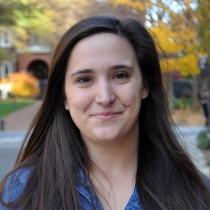
Elizabeth Balga
After graduation, what's your next adventure?
Immediately after graduation, I’m going to Huntsville to do an internship working with the Ground Based Mid-course Defense. In July, I will start a rotational career program at Boeing – the Engineering Career Foundations Program in southern California. I will be working in space, but that’s all I know right now. All together, I will have four rotations, six months each, over the next two years, so I’ll get a chance to see all of the stages in the design process.
What about your next adventure are you most excited about?
To start out working in California will be nice, but the big thing with this rotational program is getting the opportunity to work with, and be mentored by, executives in the industry. Because I’ll be moving through different projects, I might not gain the same technical depth as some others, but I’ll definitely understand how the aerospace industry works at a higher level. It will broaden my horizons, too. I would probably never opt to do commercial aircraft because I’ve always been more interested in space and in defense. But commercial aircraft is a big part of Boeing, and, because I’ll be compelled to work in that area, I’ll come out a better engineer.
Did you have any previous co-op internship or research experience that helped you get to this point?
When I first came to Georgia Tech, I did some research in the Aerospace Systems Design Lab – working on the Navel Educational Engineering Center. That got my feet wet, showed me how to how to apply analytic methods to solve an engineering problem. That helped a lot when I went for my first internship interview at Boeing, because they wanted to know how I attacked problems. I did my first internship with Boeing the summer after my sophomore year in Huntsville, working on loads and dynamics analysis through Boeing’s Accelerated Hiring Program. They flew me out to Seattle to interview my potential managers. Junior year I began working on the RECONSO mission at Tech, in the flight software group that worked on systems operations and health. After junior year I did an internship with Boeing on their Space Launch System (SLS), where I did a lot of finite element analysis. I liked the content of this internship a lot because I wasn’t pigeon-holed. I had broad interests. I also interned as a junior engineer during the spring of 2015 with an Atlanta-based firm, General Orbit Launch Services, which is headed up by a former AE professor, John Olds. I created test platforms for slosh mechanics. I got to cut things out and put things together using CAD.
How did your educational experience at Georgia Tech help you achieve your goal?
My research and internship experiences gave me great insight on leadership that I will use for my entire career. I may not be top in all areas, but leadership means you are able to recognize that and then find the people who are the top performers. Tech gave me opportunities to practice leadership through outside activities, too. My senior year, I was president of MOVE, the oldest and largest volunteer service organization on campus, I was inducted into a leadership society, Omicron Delta Kappa, and I served as president of the student chapter of AIAA. I also served as secretary of the Atlanta Section of AIAA.
What advice would you give a student who was thinking about following your steps at Georgia Tech's aerospace engineering school?
If you find yourself telling yourself that you’re not good enough to do something, don’t believe it. Instead, use it as a challenge. I learned to do that. If I thought I couldn’t do something, I made myself do it. Even if I wasn’t the number one engineer on the project, I learned a lot of things I didn’t know. Have the audacity to try at the very least. That will give you a leg up the next time.